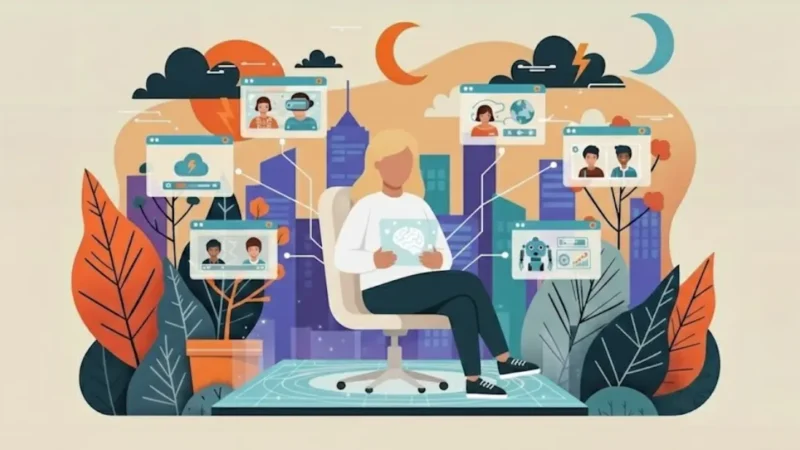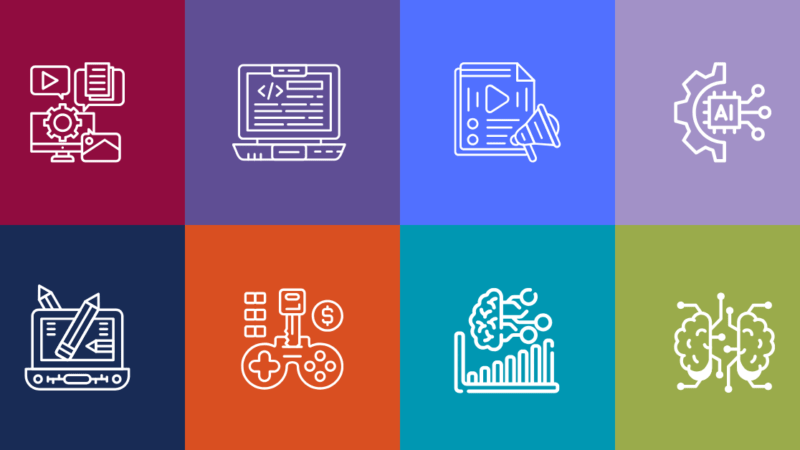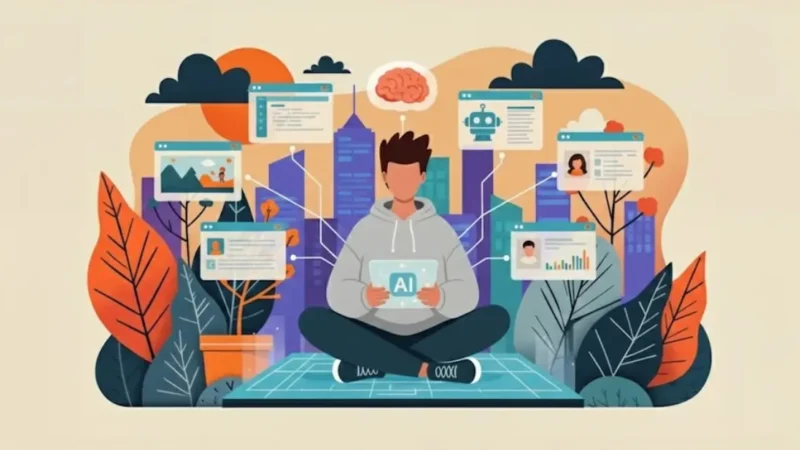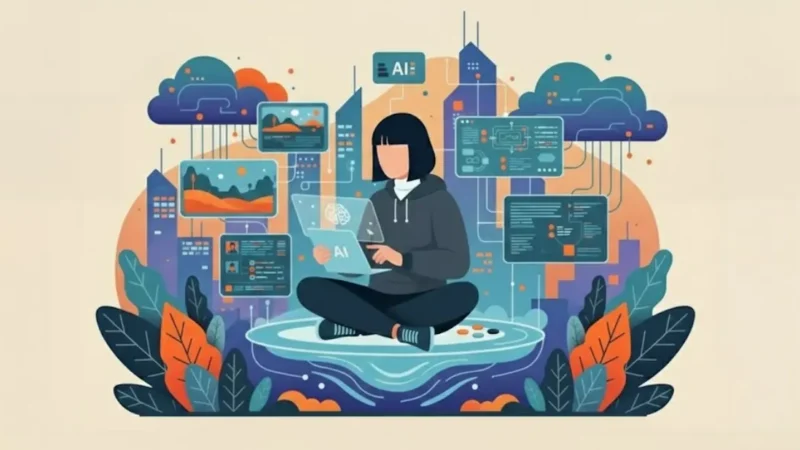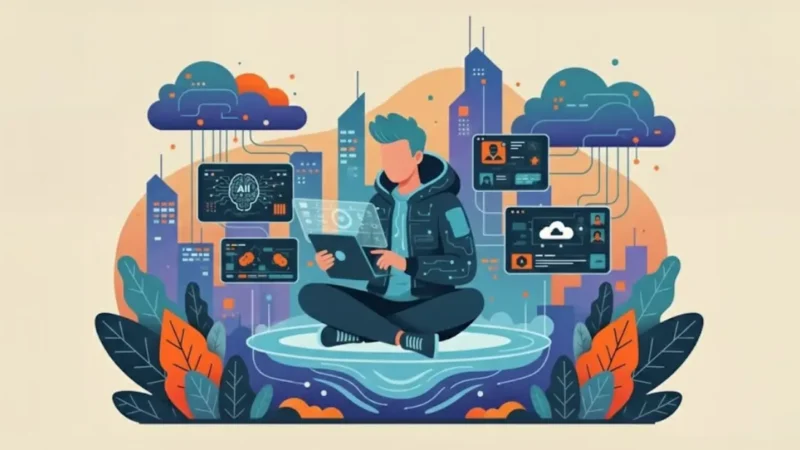Will AI Take Over Gaming? The Truth About AI’s Role in 2025
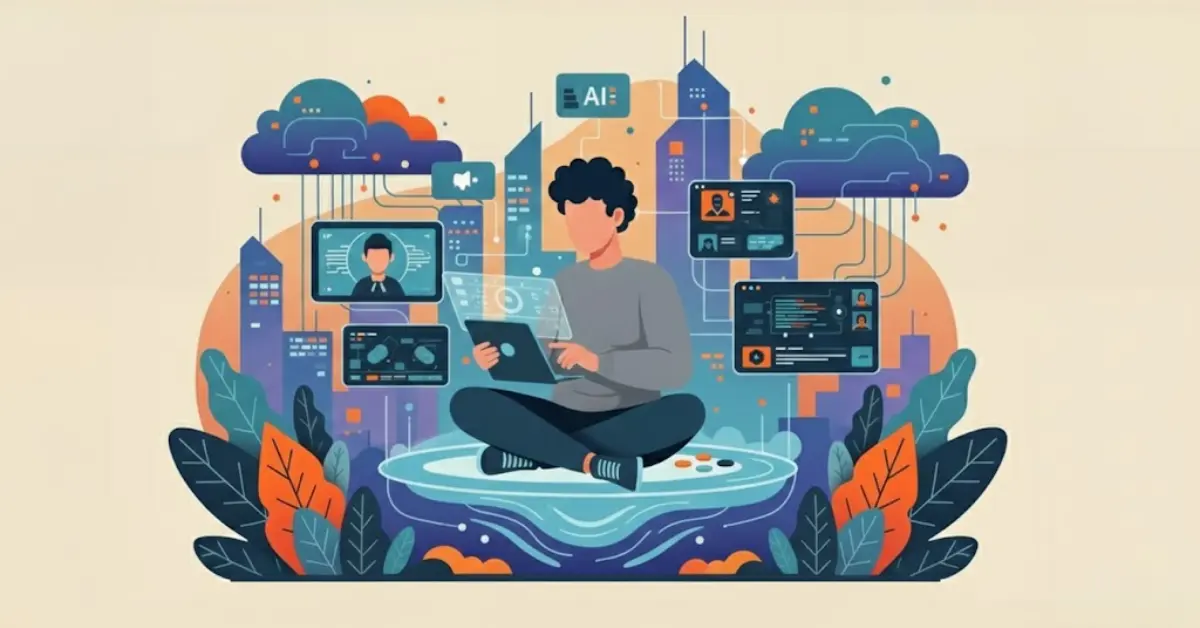
The artificial intelligence in gaming industry is experiencing an unprecedented transformation. With the global AI in gaming market projected to explode from $1.5 billion in 2024 to a staggering $9.8 billion by 2034, questions about AI’s role in the future of gaming have never been more pressing. Will artificial intelligence completely dominate the gaming landscape, replacing human creativity and traditional development methods?
The answer isn’t as black and white as many fear. Rather than a hostile takeover, ai in gaming represents a collaborative evolution that’s already reshaping how we develop, play, and experience games. From NVIDIA’s groundbreaking ACE autonomous characters to Microsoft’s revolutionary gameplay ideation models, the gaming industry is witnessing a paradigm shift that enhances rather than eliminates human involvement.
This comprehensive analysis explores the current state of AI game development, examines recent breakthroughs in gaming news, and addresses the burning question: Will AI truly take over gaming, or will it become humanity’s most powerful creative partner? Through industry statistics, expert insights, and real-world examples, we’ll uncover the truth behind AI’s role in gaming’s future and what it means for developers, players, and the industry at large.
Current State of AI in Gaming (2025)
Market Statistics & Explosive Growth
The numbers tell a compelling story about artificial intelligence for Games. The global AI gaming market has experienced remarkable growth, with industry analysts reporting multiple data points that underscore this expansion. According to comprehensive market research, the AI in gaming sector was valued at $1.5 billion in 2024 and is projected to reach $9.8 billion by 2034, representing an impressive 20.8% compound annual growth rate.
Alternative market studies suggest even more dramatic growth, estimating the ai in gaming market at $5.85 billion in 2024 with projections reaching $37.89 billion by 2034 → a 20.54% CAGR that reflects the technology’s accelerating adoption across all gaming segments.
Perhaps most telling is the adoption rate among industry professionals. Recent surveys reveal that 86.7% of gaming industry jobs now report regular use of generative AI tools, while 13.4% of gaming positions anticipate significant AI disruption by 2026. This widespread adoption demonstrates that ai game development has moved from experimental curiosity to essential industry standard.
Revolutionary AI Gaming Applications
Today’s gaming services leverage artificial intelligence across multiple dimensions, fundamentally changing how games are created and experienced. Intelligent NPCs represent one of the most visible transformations, with AI-powered characters displaying unprecedented behavioral sophistication. These digital entities now exhibit memory, emotional responses, and adaptive learning capabilities that create more immersive player interactions.
Procedural content generation has emerged as another game-changing application, with AI systems capable of creating vast, dynamic game worlds in real-time. This technology enables developers to generate infinite content variations, from terrain and architecture to entire storylines, dramatically expanding the scope and replayability of modern games.
Adaptive gameplay systems represent the third major application area, with AI continuously analyzing player behavior to adjust difficulty, pacing, and content presentation. These systems create personalized gaming experiences that evolve with each player’s skill level and preferences, ensuring optimal engagement and satisfaction.
Industry Leadership & Innovation
Major gaming companies have emerged as AI innovation leaders, with NVIDIA’s ACE (Avatar Cloud Engine) platform setting new standards for autonomous game characters. At CES 2025, NVIDIA expanded ACE beyond conversational NPCs to create characters that perceive, plan, and act with human-like intelligence and autonomy.
KRAFTON, the publisher behind PUBG, has partnered with NVIDIA to develop the world’s first Co-Playable Characters (CPC), including PUBG Ally and inZOI’s Smart Zoi. These AI companions demonstrate advanced reasoning capabilities and natural interaction patterns that blur the line between human and artificial players.
NetEase has announced plans to integrate local inference AI Teammate features into NARAKA: BLADEPOINT by March 2025, showcasing how established gaming services are rapidly incorporating cutting-edge AI technologies to enhance competitive gameplay experiences.
How AI is Transforming Gaming Experiences
Smarter NPCs and Opponents
The evolution from scripted to intelligent non-player characters represents one of artificial intelligence in gaming’s most significant achievements. Traditional NPCs followed predetermined behavioral patterns, making them predictable and often immersion-breaking. Modern AI-powered characters exhibit dynamic personalities, emotional intelligence, and the ability to form memories of past interactions with players.
Games like Red Dead Redemption 2 pioneered advanced NPC behavior systems, but 2025’s ai in gaming implementations have taken this concept to extraordinary new heights. AI characters now engage in meaningful conversations, remember player choices across multiple gaming sessions, and adapt their behavior based on observed player preferences and actions.
The upcoming release of AI Limit demonstrates how artificial intelligence for Games can create opponents that learn and evolve in real-time. These AI adversaries analyze player strategies, identify weaknesses, and develop counter-tactics that provide continuously challenging and engaging combat experiences.
Combat AI has particularly benefited from machine learning advances. Modern AI opponents can predict player movements, coordinate complex team strategies, and execute advanced tactical maneuvers that rival human expertise. This creates more dynamic and unpredictable gameplay experiences that maintain long-term player engagement.
Personalized Gaming Experiences
Ai game development has revolutionized how games adapt to individual players. Dynamic difficulty balancing systems monitor player performance in real-time, adjusting challenge levels to maintain optimal engagement without causing frustration or boredom. These systems consider factors like reaction time, accuracy, strategic decision-making, and overall progression pace.
Customized content generation represents another breakthrough in personalized gaming. AI systems analyze player preferences, playing styles, and behavioral patterns to generate tailored content experiences. This might include personalized quest lines, customized character interactions, or dynamically generated challenges that align with individual skill sets and interests.
Player behavior analysis has become increasingly sophisticated, with AI systems capable of identifying subtle patterns in player actions, preferences, and emotional responses. This data drives real-time adaptations that enhance immersion and satisfaction while maintaining appropriate challenge levels throughout the gaming experience.
Revolutionary Game Development
The impact of artificial intelligence in gaming extends far beyond player-facing features. AI-powered development tools have achieved remarkable efficiency improvements, with some studios reporting 50% reductions in testing time through automated quality assurance systems that can identify bugs, balance issues, and performance problems faster than human testers.
Automated content creation has transformed production pipelines, with AI systems generating game assets, dialogue, sound effects, and even musical scores. These tools don’t replace human creativity but rather amplify it, allowing developers to focus on high-level creative decisions while AI handles routine content generation tasks.
Enhanced development efficiency through AI has democratized game creation, enabling smaller studios to compete with larger organizations by leveraging AI tools for tasks that previously required large teams. This has led to increased innovation and diversity in the gaming industry as more creators gain access to powerful development capabilities.
Next-Generation Gaming Features
Emerging ai in gaming technologies promise even more revolutionary changes. Interactive Generative Video as Game Engine represents a breakthrough approach where AI generates game environments and scenarios in real-time based on player actions and narrative requirements. This technology could eliminate traditional game asset creation while enabling infinite content possibilities.
Advanced world modeling capabilities allow AI systems to simulate complex, persistent game worlds that evolve even when players aren’t actively participating. These worlds maintain internal logic, character relationships, and environmental changes that create truly living, breathing game universes.
Long-term memory and causal reasoning in AI characters enable persistent relationships and consequences that span multiple gaming sessions or even different games within a franchise. Players can build meaningful relationships with AI characters that remember past interactions and evolve based on shared experiences.
Recent Gaming News: AI Breakthroughs in 2024-2025
Latest AI Gaming Launches
Gaming news from 2024-2025 has been dominated by groundbreaking AI implementations. NVIDIA’s expansion of ACE to autonomous characters at CES 2025 marked a pivotal moment in artificial intelligence for Games. These characters demonstrate unprecedented autonomy, capable of independent decision-making, goal-setting, and strategic planning without predetermined scripts or player input.
The PORTAL system represents another major breakthrough, enabling AI-powered gameplay across thousands of 3D games simultaneously. This technology demonstrates how ai in gaming can create unified, cross-platform experiences that adapt to different game environments while maintaining consistent AI behavior and capabilities.
Microsoft Research has unveiled gameplay ideation models that can generate novel game concepts, mechanics, and narratives based on brief creative prompts. These systems don-represent another significant advance in ai game development, potentially accelerating the conceptualization and prototyping phases of game creation.
Industry Partnerships & Developments
Major gaming companies have formed strategic partnerships to accelerate AI adoption. The collaboration between KRAFTON and NVIDIA on Co-Playable Characters demonstrates how established publishers are integrating cutting-edge AI technologies to create innovative player experiences.
Research achievements have been equally impressive, with 177 research articles published on GPT applications in games, including 122 published in 2024 alone. This research explosion covers five prominent application areas: procedural content generation, mixed-initiative game design, mixed-initiative gameplay, playing games, and game analytics.
Cloud-based AI gaming services have advanced significantly, with major platforms offering AI-powered features that enhance gameplay across multiple devices and platforms. These services demonstrate how artificial intelligence in gaming can transcend hardware limitations and provide consistent experiences regardless of device capabilities.
Upcoming AI Gaming Technologies
The convergence of AR/VR and AI represents a major growth opportunity, with market projections indicating the AI-powered AR/VR gaming market will reach $10.11 billion by 2029. This integration promises immersive experiences that adapt to real-world environments while providing intelligent, responsive virtual elements.
Voice recognition gaming has evolved beyond simple commands to natural language interaction with AI characters. Players can now engage in complex conversations, negotiations, and collaborative problem-solving using natural speech patterns that AI systems understand and respond to appropriately.
Blockchain-based AI gaming represents an emerging frontier where AI-generated content can be verified, owned, and traded as unique digital assets. This technology could create new economic models for game content creation and distribution while ensuring authenticity and ownership rights.
The Dual Perspective: Benefits vs. Concerns
Revolutionary Benefits
Artificial intelligence in gaming delivers unprecedented benefits that enhance every aspect of the gaming experience. Enhanced immersion tops the list, with AI creating more believable, responsive game worlds that react intelligently to player actions. Characters display genuine emotional responses, environments adapt dynamically to player behavior, and narratives evolve based on individual choices and preferences.
Infinite content generation capabilities address one of gaming’s fundamental limitations: finite content. Through procedural generation and adaptive storytelling, ai in gaming can create virtually unlimited gameplay experiences, ensuring that no two playthroughs are identical and providing continuous novelty for long-term engagement.
Cost efficiency represents a crucial advantage for gaming services, with AI automation reducing development time and costs while maintaining high-quality output. Studios can produce more content with smaller teams, enabling creative risks and experimental projects that might not have been financially viable under traditional development models.
Accessibility improvements through AI have opened gaming to broader audiences. Adaptive difficulty systems ensure that players of all skill levels can enjoy challenging but fair gameplay experiences, while AI-powered assistive technologies help players with disabilities participate fully in gaming communities.
Industry Concerns
Despite these benefits, the gaming industry faces legitimate concerns about AI adoption. Job displacement represents the most immediate worry, with 21,500+ gaming jobs lost between 2023-2024. While some positions have been eliminated due to AI automation, the relationship between AI adoption and job losses remains complex and multifaceted.
Creative authenticity concerns have sparked passionate debates within the gaming community. Many artists and designers express strong opposition to AI-generated content, fearing that artificial intelligence could devalue human creativity and artistic expression. The challenge lies in finding balance between AI efficiency and human creative input.
Intellectual property issues surrounding AI-generated content remain largely unresolved. Questions about ownership, copyright, and compensation for AI-created assets continue to generate legal and ethical debates that the industry must address as AI adoption accelerates.
Human touch preservation represents perhaps the most philosophical concern. Critics worry that ai game development might prioritize efficiency over emotional depth, potentially creating technically impressive but emotionally hollow gaming experiences that lack the human creativity that makes games truly memorable.
Expert Perspectives
Industry leaders offer varied perspectives on AI’s role in gaming’s future. Michael Vance, former Activision CTO, believes AI holds “a ton of promise” for game development, emphasizing its potential to enhance rather than replace human creativity.
Bobby Kotick, former Activision Blizzard CEO, acknowledges that AI will have “meaningful impact on society, both positive and negative,” highlighting the need for thoughtful implementation and ethical considerations.
Kangwook Lee from KRAFTON expresses excitement about “the possibilities of ACE autonomous game characters, and how AI will enhance the way we create games,” demonstrating industry optimism about collaborative AI-human development approaches.
Will AI Actually “Take Over” Gaming?
Redefining “Takeover”
The question “Will AI take over gaming?” requires careful examination of what “takeover” actually means. Rather than a hostile replacement of human involvement, artificial intelligence in gaming represents a collaborative enhancement tool that amplifies human creativity rather than eliminating it.
Ai in gaming excels at handling routine, repetitive tasks while freeing human developers to focus on creative direction, emotional storytelling, and innovative gameplay concepts. This partnership model suggests transformation rather than replacement, with AI handling technical execution while humans provide creative vision and emotional intelligence.
The evidence suggests that artificial intelligence for Games serves as a powerful creative multiplier, enabling smaller teams to achieve results that previously required large development organizations. This democratization of game development tools could lead to increased innovation and diversity rather than reduced human involvement.
The Realistic Future
Ai game development is evolving toward hybrid approaches that leverage both artificial intelligence and human expertise. AI systems handle technical optimization, content generation, and routine testing while human developers focus on narrative design, creative direction, and player experience crafting.
The most successful implementations of gaming AI maintain clear boundaries between artificial and human contributions. AI provides the technical foundation and adaptive capabilities while humans supply the creative vision, emotional depth, and cultural context that make games meaningful and engaging.
Future gaming services will likely feature seamless integration between AI capabilities and human creativity, with players potentially unaware of which elements are AI-generated and which are human-created. This transparency suggests successful collaboration rather than dominance by either side.
Future of AI in Gaming: What’s Next?
Emerging Technologies
Cloud-based AI gaming platforms represent the next major evolution, enabling sophisticated AI features across all devices regardless of local hardware capabilities. These platforms will democratize access to advanced AI gaming features while reducing the technical barriers that currently limit widespread adoption.
Wearable device integration with ai in gaming promises unprecedented immersion levels. Brain-computer interfaces, haptic feedback systems, and biometric monitoring could enable AI systems to respond to player emotional states, stress levels, and engagement patterns in real-time.
Advanced VR/AR experiences powered by artificial intelligence in gaming will create hybrid reality environments where AI-generated content seamlessly blends with real-world elements. These systems could enable persistent, location-based gaming experiences that adapt to physical environments and social contexts.
Predicted Developments
Fully personalized game worlds represent a major development target, with AI systems creating entirely unique gaming universes tailored to individual player preferences, cultural backgrounds, and personal interests. These worlds would evolve continuously based on player behavior and feedback.
AI coaching for e-sports could revolutionize competitive gaming by providing real-time strategic advice, performance analysis, and skill development guidance. These systems could democratize access to high-level competitive training while identifying and nurturing new talent.
Revolutionary content creation tools powered by ai game development will enable players themselves to create sophisticated game content through natural language descriptions, sketches, or conceptual ideas. This could blur the line between content creation and consumption.
Timeline & Expectations
Short-term developments (2025-2027) will likely focus on refining current AI applications, improving NPC intelligence, and expanding procedural content generation capabilities. Expect more sophisticated AI companions, better adaptive difficulty systems, and enhanced development tools.
Medium-term evolution (2028-2032) should deliver more revolutionary changes, including fully autonomous game characters, cross-game AI personalities, and sophisticated AI-powered content creation tools that enable rapid game development and modification.
Long-term transformation (2033-2035) may bring about fundamental changes in how gaming is conceptualized, with AI potentially enabling real-time game generation based on player preferences and completely personalized gaming universes that exist nowhere else.
Frequently Asked Questions
Will AI replace human game developers?
Artificial intelligence for Games is unlikely to completely replace human developers but will significantly change their roles and responsibilities. While AI excels at technical tasks like testing, optimization, and content generation, human creativity remains essential for narrative design, emotional storytelling, and innovative gameplay concepts. The future likely involves collaboration where AI handles routine tasks while humans focus on creative vision and player experience design.
How is AI currently being used in game development?
Ai game development currently encompasses multiple applications including intelligent NPC behavior, procedural content generation, automated testing and quality assurance, dynamic difficulty adjustment, and player behavior analysis. Studios use AI for asset creation, dialogue generation, music composition, and performance optimization. The technology has evolved from experimental curiosity to essential development tool across the industry.
What are the benefits of AI in gaming?
Ai in gaming delivers numerous benefits including enhanced immersion through intelligent characters and adaptive environments, infinite content generation capabilities, improved accessibility through adaptive difficulty systems, cost efficiency in development processes, and personalized gaming experiences tailored to individual player preferences. These advantages enable more engaging, diverse, and accessible gaming experiences.
Which games use AI technology effectively?
Several games showcase effective artificial intelligence in gaming implementation. Red Dead Redemption 2 features sophisticated NPC behavior systems, AI Dungeon uses AI for dynamic storytelling, Hello Neighbor employs adaptive AI antagonists that learn player strategies, and upcoming titles like AI Limit demonstrate advanced AI opponents. NARAKA: BLADEPOINT will soon feature AI teammates for enhanced cooperative gameplay.
How does AI improve NPC behavior?
Gaming AI enhances NPC behavior through machine learning algorithms that enable characters to exhibit memory, emotional responses, and adaptive learning capabilities. Modern AI NPCs can remember past player interactions, develop unique personalities, engage in meaningful conversations, and adapt their behavior based on observed player preferences. This creates more believable and immersive character interactions.
What is procedural content generation in gaming?
Procedural content generation in ai in gaming refers to AI systems that create game content automatically, including terrain, levels, quests, dialogue, and entire game worlds. This technology enables infinite content variety, reduces development costs, and ensures unique experiences for each player. AI can generate everything from simple textures to complex narrative scenarios based on predefined parameters and player behavior patterns.
Are there ethical concerns with AI in gaming?
Artificial intelligence for Games raises several ethical concerns including job displacement for human developers, intellectual property questions regarding AI-generated content, data privacy issues related to player behavior analysis, and concerns about AI addiction or manipulation through personalized engagement systems. The industry continues to develop guidelines and best practices to address these challenges responsibly.
How does AI personalize gaming experiences?
Gaming services use AI to analyze player behavior, preferences, and skill levels to create customized experiences. AI systems monitor gameplay patterns, adjust difficulty in real-time, generate personalized content, recommend relevant game features, and adapt narrative elements to individual player choices. This personalization enhances engagement and satisfaction while maintaining appropriate challenge levels.
What’s the difference between traditional game AI and modern AI?
Traditional game AI relied on scripted behaviors and predetermined decision trees, creating predictable and limited interactions. Modern ai in gaming employs machine learning, neural networks, and advanced algorithms that enable dynamic learning, adaptation, and creativity. Contemporary AI can generate original content, learn from player behavior, and exhibit human-like intelligence and unpredictability.
Will AI make games more expensive to develop?
Initially, ai game development tools may require significant investment in technology and training. However, long-term benefits include reduced development time, automated content creation, and improved efficiency that often result in lower overall development costs. AI enables smaller teams to achieve results previously requiring large development organizations, potentially making game development more accessible and cost-effective.
Conclusion: The Collaborative Future
The evidence overwhelmingly suggests that artificial intelligence in gaming represents transformation rather than takeover. While AI will continue to revolutionize how games are developed, played, and experienced, human creativity, emotional intelligence, and innovative thinking remain irreplaceable elements of compelling gaming experiences.
The future of ai in gaming lies in collaboration, not domination. As AI handles increasingly sophisticated technical tasks, human developers gain freedom to focus on what they do best: crafting meaningful narratives, designing innovative gameplay mechanics, and creating emotional connections between players and games. This partnership promises a golden age of gaming innovation where technological capability meets human creativity to produce experiences beyond what either could achieve alone.
Rather than asking whether AI will take over gaming, we should embrace the collaborative potential that artificial intelligence for Games represents. The industry’s future belongs to developers, players, and creators who learn to work alongside AI as a powerful creative partner, ushering in an era of gaming experiences that are more personalized, more immersive, and more emotionally resonant than ever before.

